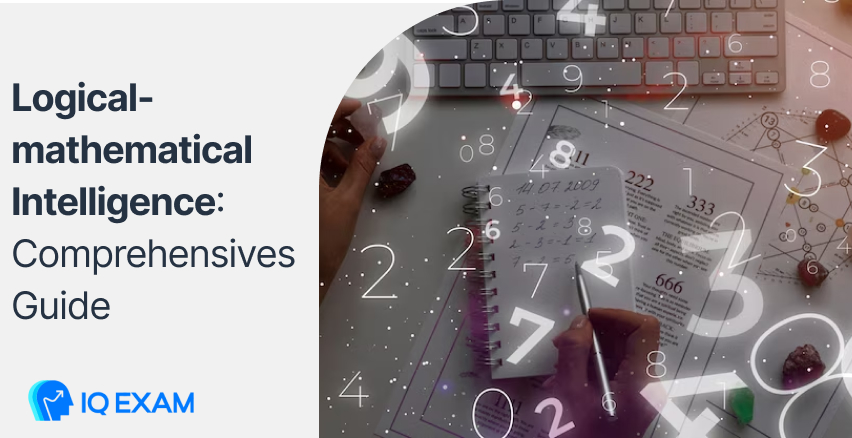
We can all agree on the fact that if there is a universal language, it must be math. Since the laws of physics are assumed to be uniform throughout the universe, mathematics is the universal language used to express these laws.
That is probably one of the most important reasons that the educational system primarily focuses on mathematics. Howard Gardner categorized intelligence into nine different groups, one of which is logical-mathematical intelligence.
But what does “logical-mathematical intelligence” really mean? Why is it necessary, and how can we excel in it?
In today’s blog, we conducted a thorough exploration and gathered everything you need to know about logical-mathematical intelligence. So, if you are eager to learn more about your brain, keep scrolling!
What Is Logical-mathematical Intelligence?

Logical-mathematical intelligence is thinking logically, detecting patterns, and reasoning deductively. Basically, logical-mathematical intelligence concerns one’s ability to recognize patterns, analyze problems, and solve complicated equations.
This type of intelligence, which is what educators focus on at school, is used mainly in the areas of physics, chemistry, and math. In other words, when it comes to topics that require more logic and analysis, logical-mathematical intelligence is what you need.
Characteristics Of Logical-Mathematical Intelligence

Recognizing Patterns
People with high logical-mathematical intelligence are very good at identifying patterns. They read the data and understand the fact that the only way you can find a pattern is to have enough knowledge and layer enough data together to make it clear for yourself.
Looking for rational explanations
No matter what, people with high logical-mathematical intelligence always look for rational explanations. They won’t accept a fact that is not supported by solid logic and explanation.
Being Objective
Being objective means you have found a way to look at things in a manner other than your perception and consider different ideas and points of view. You’ve trained yourself to be open-minded, and that is one of the characteristics of people with logical-mathematical intelligence.
Organizing things by category
Organizing things by category helps you to have better control and understanding of everything, and that is one of the most important reasons why people with high logical-mathematical intelligence organize things by category.
Top 10 Suitable Logical-Mathematical Intelligence Careers
- Computer analyst
- data mining analyst
- Purchasing agent
- Business Analytics
- Accounting
- Mathematics
- Statistics
- Electronic engineer
- Computer technician
- Investment manager
7 Famous People With High Logical-Mathematical Intelligence

- Stephen Hawking
- Bill Gates
- Marie Curie
- Johannes Kepler
- Louis Pasteur
- Thomas Edison
- Albert Einstein
How Logical-Mathematical Skills Impact Daily Life

Financial Planning
Financial planning is one of the most essential parts of every adult’s life. High logical-mathematical intelligence helps you to handle your money and make the best investment decisions.
Legal and Contractual Agreements
Excelling logical-mathematical intelligence is also about improving your decision-making skills, which can be helpful when it comes to legal and contractual agreements.
Logical-mathematical Learning Style

Learning styles refer to the different ways through which individuals process and retain information. One of the learning styles that has been identified is the logical-mathematical style. This learning style is based on an individual’s ability to think logically, solve problems, and find patterns.
Those who have a logical-mathematical learning style tend to learn better through critical thinking and deduction.
Advantages
People with a logical-mathematical learning style have numerous advantages when it comes to learning. For instance, here are some of the advantages:
Ability to solve complex problems by breaking them down into simpler parts
Identifying patterns that others may not see
Ability to evaluate information objectively and come up with a logical conclusion based on their observation, leading to better decision-making skill
Disadvantages
Struggle to think outside the box
Lack of creativity
Practical Tips to Boost Logical-Mathematical Intelligence

Now, you have a better understanding of this concept. You know what logical-mathematical intelligence is and how it matters. By now, you are probably thinking whether you can improve this intelligence and boost your logical-mathematical intelligence or if it’s something you are born with.
The good news is there’s nothing you can’t achieve with hard work and practice. In this part, we have prepared some of the best tips that will help you enhance your logical-mathematical intelligence.
Using Visual Aids
Using visual aids such as graphs, diagrams, and charts will help you understand complex concepts. This way, you can see patterns and relationships more clearly and learn how to identify them so you can process complicated information more easily.
Participating In Debates
Participating in discussions and debates is a good practice to train your brain and improve your critical thinking skills. Facing different perspectives and various points of view provides you with an opportunity to analyze others’ opinions and critique them.
Also, engaging with these sorts of conversations allows you to learn how to express your ideas and opinions better.
Focusing One One Part At a Time
Another method you could use to improve your logical-mathematical intelligence is to break down complex concepts into smaller parts and deal with each part one by one. This way, you can process the topic better and more effectively.
FAQ
What Is The Difference Between Reason And Logic?
In mathematics, we use logic when an equation follows a very rigid rule that gives you one answer. For instance, one plus one equals two. And that is logical.
But that’s not the only place we use logic. Logic is also a language of philosophy that allows philosophical ideas to be shared and expressed. Basically, logic is like a foundation on which philosophical debates take place.
However, logic limits your ability to express things that go beyond reason. And that’s when we refer to rationality since it is more subjective and less scientifically rigorous.
Do Official IQ Tests Only Measure Logical/Mathematical Intelligence?
No. This is a tricky question. There has been quite a bit of a debate when it comes to the IQ test and its accuracy. But the truth is that two psychologists designed IQ tests to identify students who may have a slower processing speed so that they could provide them with additional classes and teachers.
However, IQ tests started to lose their purpose when mankind labeled itself with only one number. An IQ test does not measure any kind of intelligence. It will test a small part of your cognitive abilities and mathematical intelligence, but it’s not a piece of information you can rely on and define your intelligence by it.
There are so many great minds who may have average IQ scores. Artists, authors, chiefs, and athletes who are described as geniuses in their careers may have average IQ scores. So, the answer to your question is that IQ tests don’t really measure your intelligence, whether it’s logical, mathematical, or any other type of intelligence!
Last Words
In this article, we spoke about logical-mathematical intelligence from Howard Gardner’s theory of multiple intelligences. Logical-mathematical intelligence refers to the ability to solve problems, find patterns, and think critically. This type of intelligence deals with numbers and analysis.
Of course, excelling in logical-mathematical intelligence is possible by doing some exercises to train your mind, which we mentioned in this article. So, if you aren’t naturally good with logic and math, you have nothing to worry about.
Also, if you are neither logical nor mathematically intelligent and nor have any interest in being so, that doesn’t mean you are not wise. Based on Howard Gardner’s theory, logical-mathematical intelligence is just one of the nine types of intelligence. You have to stop forcing yourself into liking math and start figuring out what you are good at.
Maybe your musical intelligence is high, or perhaps you are interpersonally intelligent, or even both!
